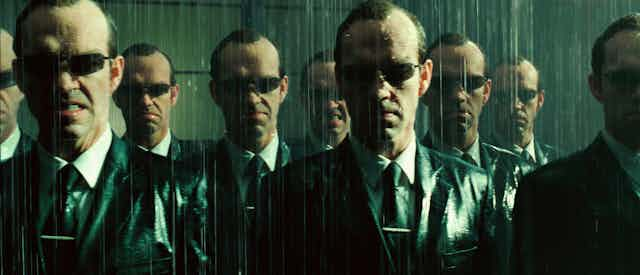Showbusiness is about entertainment, right? Film-going should be fun. We want to laugh or squeal or sigh as emotion arises in us when the music swells and the camera zooms in for an extreme close up … but do we also want to think?
Marketers might wish the only thing viewers think about on leaving the cinema is where they can buy the product placement that was endorsed on the big screen. But many of us – contemporary philosophers included – have much higher hopes.
Some films do get us thinking, and there are a new breed of philosophers who are excited about the possibility that film can convey philosophical ideas. Michael Levine and Damian Cox claim The Matrix (1999) invites viewers to consider philosophical ideas such as “What is real?”
Neo (Keanu Reeves) has a choice between a red and a green pill. One allows him to continue living the life he has always known, which is an illusion, and the other wakes him up to the fact that a computer known as the matrix has been controlling all of his experiences up until this point. Which pill would you choose?
In telling Neo’s story, we see film can be the perfect medium to screen “thought experiments”, the traditional fictional examples used by philosophers to explore ideas.
In Ancient Greece, philosophers such as Plato (429-47 BCE) discussed the classical thought experiment known as the allegory of the cave in order to consider whether we could trust our knowledge of the world that is gained through our senses. The philosophical question “Is the world as it appears to be?” is convincingly explored in films such as The Matrix and Inception (2010).
Those films are screening philosophical ideas studied in epistemology that ask what we can know and whether we have reasonable grounds for trusting the world really is as it appears to us.
The classical thought experiment comes alive and is even more convincing when depicted on the big screen; and philosophers such Thomas Wartenberg claim “film is able to give philosophical concepts and ideas a human garb that allows their consequences to be perceived more clearly”.
For the philosophers who are celebrating films, there is much to celebrate. Films can introduce large audiences to philosophical ideas and make these concepts far more accessible and interesting than a technical article published in an academic journal. (Don’t get me wrong, there’s a place for those as well of course.)
Wartenberg gives the example of Eternal Sunshine of the Spotless Mind (2004), which plays out what could happen if people were able to erase their memories of failed relationships which caused them grief. Yet, unless the viewers are then thinking about or reflecting upon those ideas, are they really “doing” philosophy at all?
Claiming that films can be philosophical doesn’t mean that the majority of films are or that most audience members critically engage with the films they watch. Perhaps this is why not all philosophers have always been excited by the idea that films could encourage critical viewers to reflect on life, truth and morality.
Writing in the 1930s, theorists such as T. W. Adorno and Max Horkheimer feared the advent of the Hollywood Studio film as akin to Nazi propaganda. As Jewish academics working in America at the time of the Studio System, Adorno’s concern was that mass produced and distributed artworks portrayed social norms as immutable reality.
If the viewer’s imagination cannot enter and engage with messages depicted through the filmic medium, then viewers cannot critique the moral and social status quo as screened; instead, they simply receive it, and the depicted stereotypes are reinforced.
While Adorno may have overstated this concern, we have to admit Hollywood and Bollywood films still rely heavily on stereotypes. Consider the popularity of formulaic rom-coms or the endless car chase sequels.
Should we worry that viewers ingest these stories and the stereotypes therein passively without reflection? Those images convey values. Do they adversely affect how we relate to others and see men, women, cultures, or the trajectory of romantic relationships?
That’s not an easy question to answer and generally people worry more about – say – the effect of graphic depictions of violence. While there have been empirical studies on this, psychologists do not conclusively agree. Meanwhile, even theorists such as Adorno admit that films reflect society and will only change when society changes.
Therefore, it seems to me that critical thinking needs to be encouraged early on. By the time you’re selecting which films to see, you’re either likely to reflect critically on what you watch or not.
Films can certainly offer new and diverse perspectives, giving audiences the opportunity to imaginatively engage with stories and characters they may otherwise never encounter in real life. Tom Hanks starred in Philadelphia, widely credited with raising awareness about HIV and AIDS in the 1990s.
Yet, unfortunately, most popular films that are digested in large quantities promote stereotypes with dubious moral value, such as the classic rom-com with its pining heroine, commitment-phobic hero and the predictable final scene full of flowers, smiles and a white dress.
Even Katherine Heigl admits she starred in too many romantic comedies and they became rote and unchallenging.
Hollywood blockbuster films are screened ubiquitously and many simply do not encourage active, intelligent, imaginative participation with the stereotypes they depict. While this does not defeat claims that films can “do” philosophy, I believe it highlights the need to focus not just on the film itself, but also on the critical (or passive) viewer watching the film.

